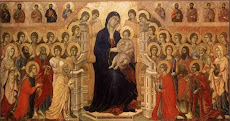Why beliefs in negative spirits/demons/witches?
In part, panic will push people to look for explanations everywhere. I’m reminded of a scene from All Creatures Great and Small (1978) where James Herriot is furious with a local older farmer for pushing folk remedies on the young farmer that Herriot is trying to help. Herriot’s fury is fueled by his frustration, namely (prior to World War II and antibiotics) the fact that he can't offer anything much better.
In part, beliefs in a cosmically evil world persisted because Protestantism removed Saints (an entire pantheon of beings between humans and God) from theology, creating a void. Protestantism filled that void with demons. It then attempted to eradicate its solution with a focus on grace, the concept of instant sanctification, and a reasonable God. Those solutions, however, created their own problems:Beliefs in cosmic evil didn’t linger so much as get renewed during the late eighteenth to nineteenth centuries with Millennialism. Astrology, magic, miracles, supernatural encounters, visions, dreams—the good and the bad of transmundane beliefs—resurged in a push back against Enlightenment thinking. The feeling was that so much orderliness was stripping humans of the full spiritual experience. Beliefs in otherworldly things are still around; hence, the Satanic daycare accusations that took off in the 1980s. And I haven’t even discussed The Exorcist! (I’m not going to.)
Consequently, in recent years, some writers have blamed the Enlightenment for ruining religion while Enlightenment believers have blamed religion for keeping everyone thinking medievally.
I think the argument is as pointless as atheists arguing with fundamentalists. The Enlightenment—a highly varied movement itself—underscored the concept of a rational and reasonable deity. The associated assumptions impact everything from church organization to charity work to scripture reading. Many things we take for granted—such as forensics as evidence—are both older than the Enlightenment and were encouraged by the Enlightenment. Theology, likewise, has always focused on producing a coherent explanation of God and God's acts.On the other side (supposedly on the other side), belief in things beyond the observable senses is part of the human
condition. There's a reason human beings can imagine and plan and create
connections between people and events and objects. In addition, there are far too many instances of human beings
taking observable evidence as the end of a conversation and being wrong for a sensible person not to accept that life is more complicated than what is immediately on the table.
Blaming the Enlightenment OR blaming religious beliefs is a waste of time. Anything can be turned into a fetishistic object of worship, including non-supernatural events and people and things. Better to accept both sides of the human experience and THEN try to come up with a decent solution.
Next: The Book of Mormon and demons/devils...



No comments:
Post a Comment